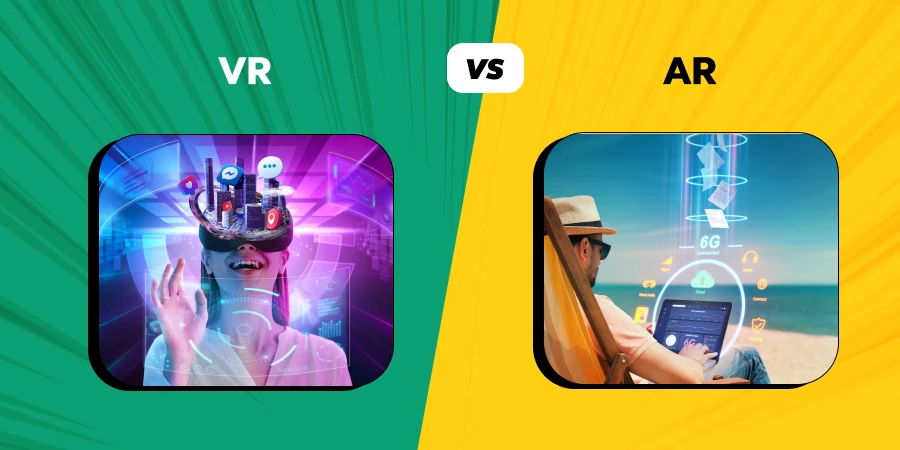In recent years, Augmented Reality (AR) and Virtual Reality (VR) have become two of the most talked-about technologies in the digital world. From gaming and shopping to healthcare and education, both AR and VR are transforming industries and reshaping how people interact with technology.
Although AR and VR are often mentioned together, they are not the same. Each technology has its own unique approach, applications, and impact. To fully understand their potential, it’s important to explore the differences, similarities, and the role they play in shaping our future.

What is Virtual Reality (VR)?
Virtual Reality immerses users in a completely digital environment, cutting off the physical world. By wearing devices like VR headsets (Oculus Quest, HTC Vive, PlayStation VR), users enter simulated 3D worlds where they can interact with objects, characters, and environments.
- Example: Playing a VR game where you fight zombies in a virtual city.
- Applications:
- Gaming and entertainment
- Virtual tours of museums and real estate
- Military and medical training simulations
- Therapy for mental health (e.g., PTSD treatment)
VR is about immersion-it places you inside a digital experience that feels real.
What is Augmented Reality (AR)?
Augmented Reality enhances the real world by overlaying digital elements onto physical surroundings. Unlike VR, AR doesn’t replace reality; it adds to it. This is usually done via smartphones, tablets, or AR glasses.
- Example: Pokémon GO, where players catch digital Pokémon in real-world locations.
- Applications:
- Retail (trying on clothes or furniture virtually)
- Education (3D models of planets or anatomy in classrooms)
- Navigation with live directions on streets
- Healthcare (AR-assisted surgeries)
AR is about enhancement-it improves real-world interactions with digital layers.
Key Differences Between AR and VR
| Feature | Augmented Reality (AR) | Virtual Reality (VR) |
|---|---|---|
| Environment | Enhances the real world | Replaces reality with a virtual world |
| Devices | Smartphones, tablets, AR glasses | VR headsets, controllers |
| Immersion | Partial immersion (real + digital) | Full immersion in a virtual space |
| Accessibility | More affordable and widely available | Expensive and requires specialized gear |
| Main Focus | Blending digital with reality | Creating entirely new experiences |
Similarities Between AR and VR
- Both are immersive technologies that enhance user experience.
- Both rely on 3D graphics, sensors, and interactive elements.
- Both are used in industries like gaming, healthcare, education, and retail.
Together, AR and VR are part of the broader field called Extended Reality (XR).
Future of AR and VR
Both AR and VR are growing at rapid speeds:
- AR Future: Expected to become more mainstream with AR glasses and integration into shopping, work, and navigation.
- VR Future: Will continue to dominate gaming and training, with more realistic and affordable headsets.
- Metaverse Connection: Companies like Meta (Facebook) are building metaverse ecosystems combining AR and VR for social, work, and entertainment experiences.
By 2030, AR and VR are predicted to merge even further, creating experiences that blur the line between physical and digital worlds.
Which is Better-AR or VR?
There’s no universal winner between AR and VR-it depends on the use case:
- For immersive gaming and simulations, VR is unmatched.
- For practical applications like shopping, navigation, and education, AR leads the way.
Ultimately, both technologies complement each other and are shaping a future where physical and digital realities coexist seamlessly.
Conclusion
Augmented Reality adds digital layers to our real world, while Virtual Reality immerses us in entirely new ones. Both technologies are powerful in their own ways and are transforming industries from gaming to healthcare. As AR and VR continue to evolve, they will redefine the way we live, work, and play.
Also Check Tech for Good – Comprehensive Guide – 2025.




1 thought on “Augmented Reality vs Virtual Reality – Free Guide – 2025”